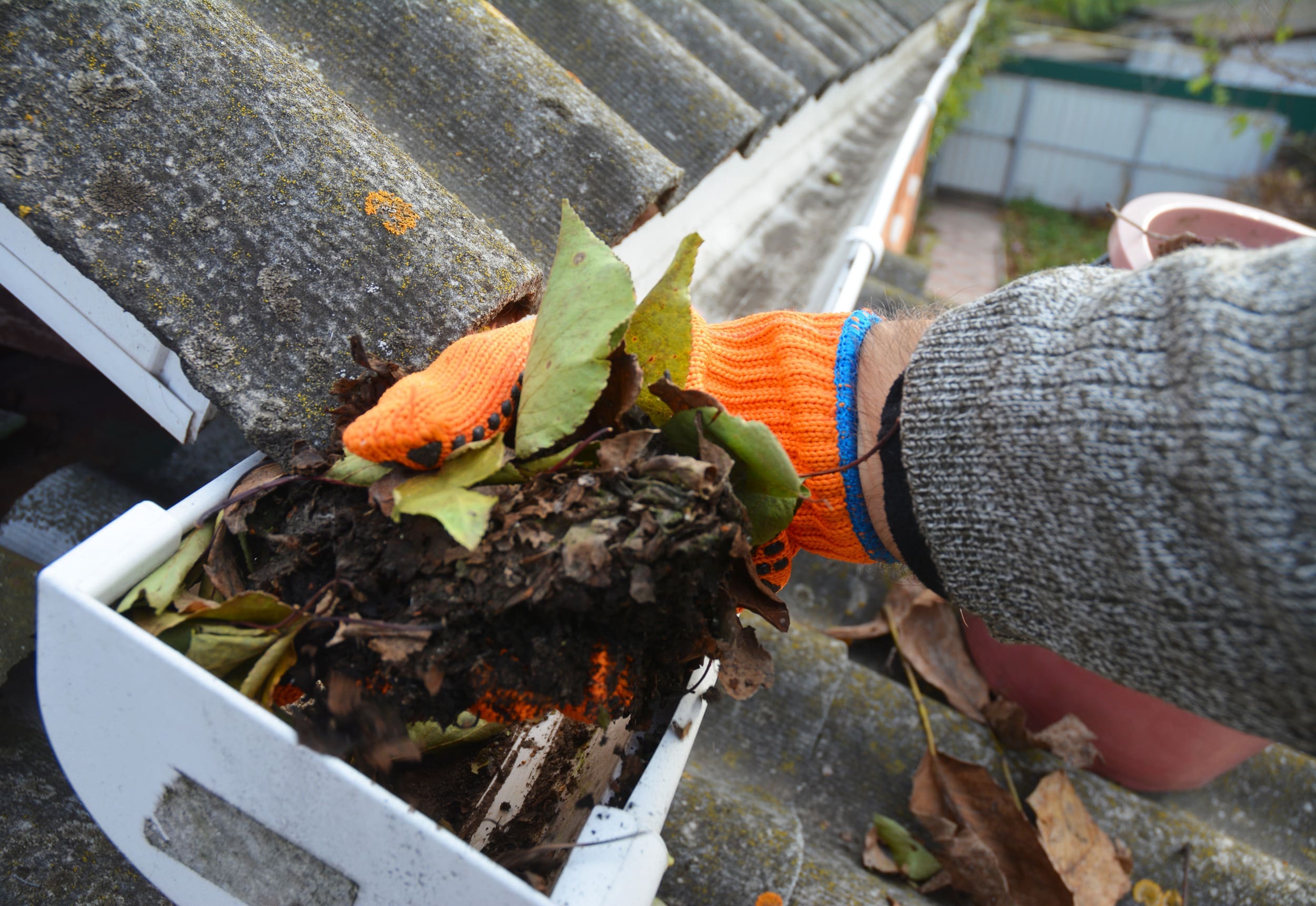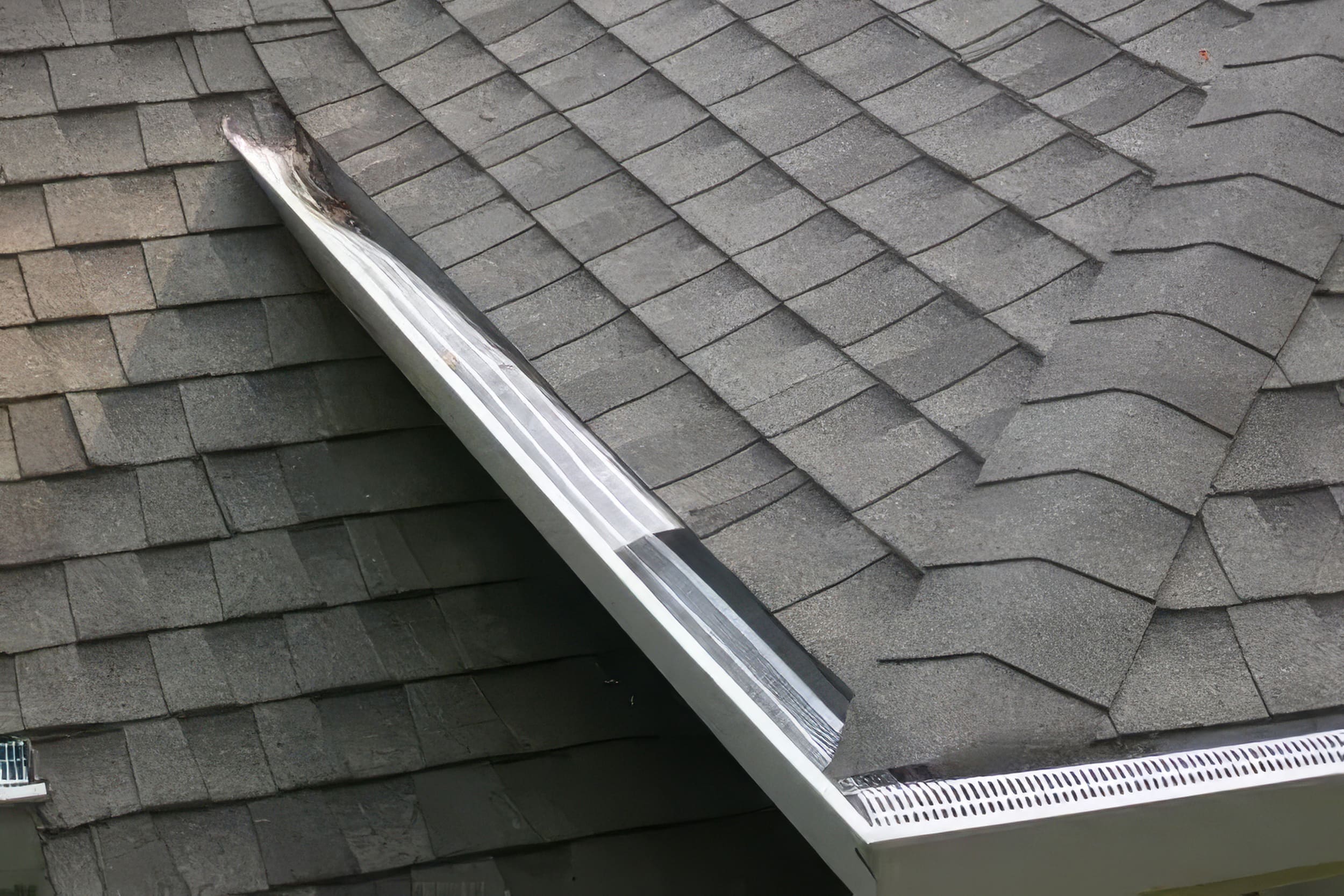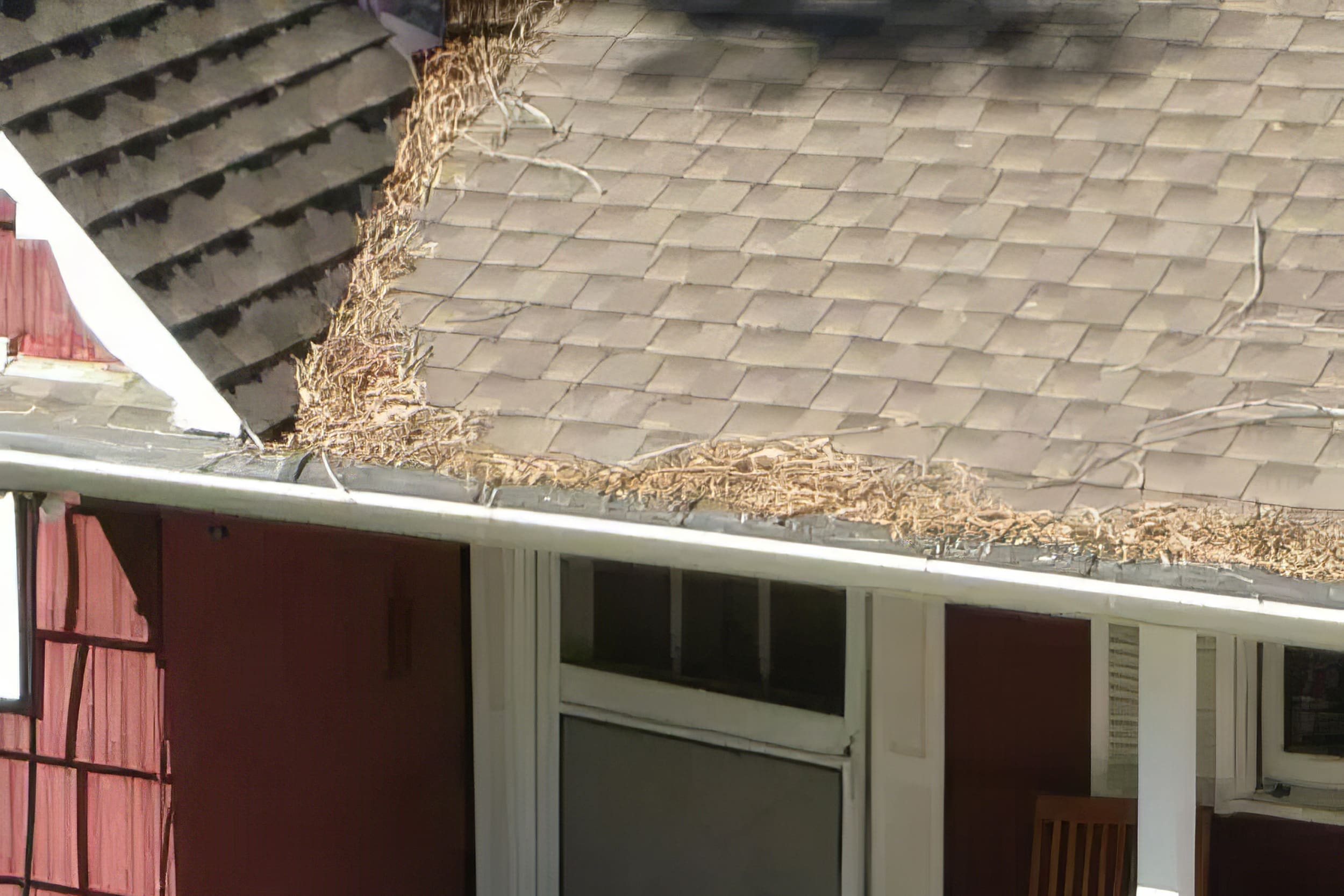IN THE EVENT OF AN EMERGENCY THIS SITE IS NOT MONITORED. FOR CURRENT INFORMATION GO TO HTTPS://EMERGENCY.MARINCOUNTY.GOV.
Fire-Resistant Gutters
Gutters are important for collecting water but they also can collect leaves and other debris, making them susceptible to wildfire embers which can spread fire to your home. Regular clearing is necessary to reduce wildfire risk. The design and material of your gutters can also help protect your home from wildfire.

The roof deck boards in this eave overhang area are decayed. These boards would be easily ignited if debris in the gutter ignited. In this case, angle flashing at the roof edge was used, but the poor condition of the roof would still make this a vulnerable area.
Burning leaves in gutter can easily spread fire into the home, particularly if there is inadequate flashing between the gutter and the roof line.
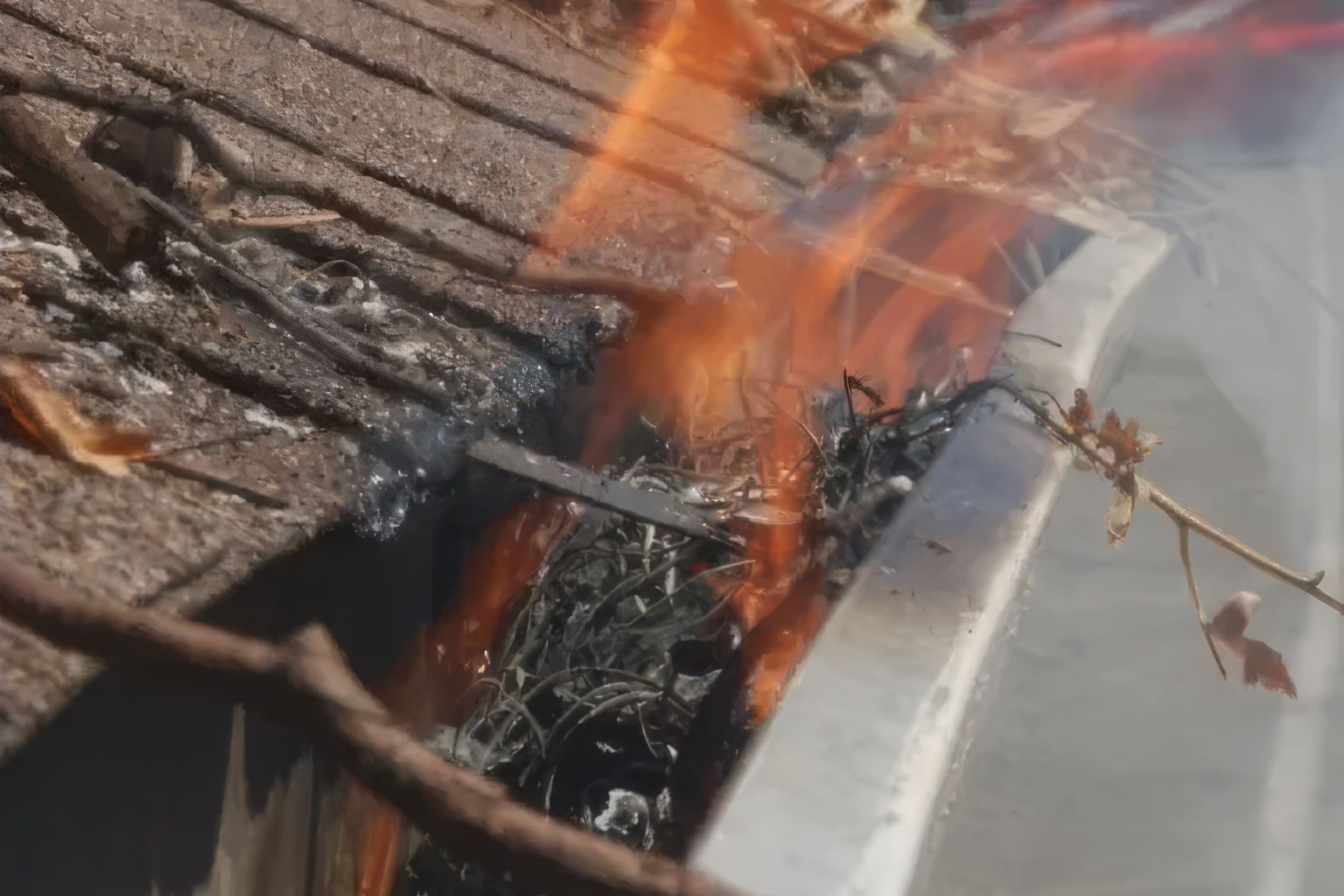
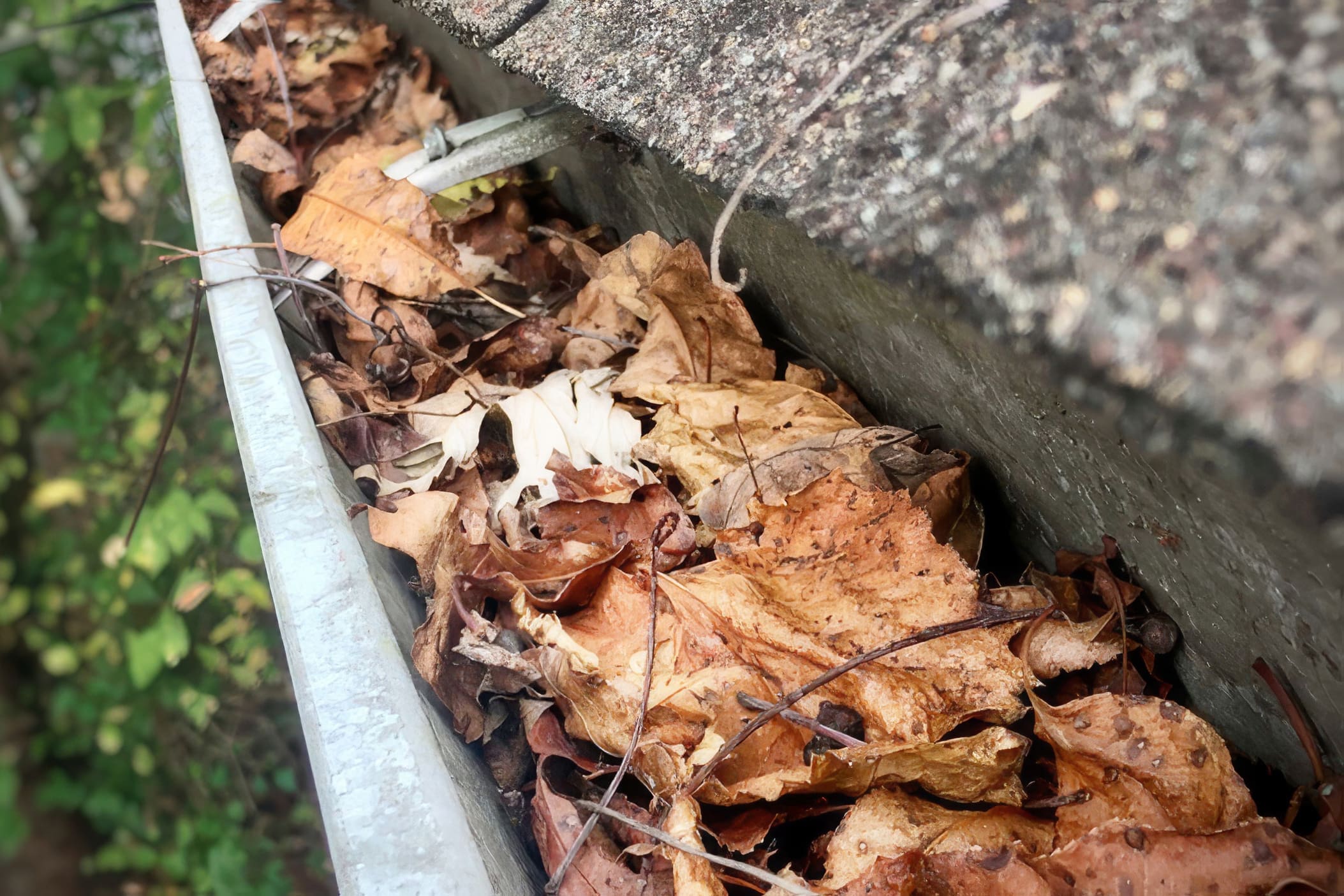
Unscreened gutter leads to heavy accumulation of leaves and other combustible materials
Combustible debris such as leaves and pine needles can accumulate in gutters, especially from nearby or overhanging trees. Because it can be difficult to access a home’s upper stories, gutters are even more problematic to clean out on a regular basis. If ignited, combustible debris in the gutter will expose the edge of the roof covering, typically the fascia and/or roof sheathing. Depending on the condition of the wood and presence (or absence) of metal flashing at the edge of the roof, debris in the gutter may make it easier for fire to enter the attic. Metal flashing at the roof edge will provide additional protection to the roof edge, and is, therefore, a recommended detail.
Metal Gutters Recommended
Metal gutters have been recommended over plastic gutters in fire hazard areas. Embers will ignite accumulated debris in any gutter. Metal gutters will stay in place, and therefore the resulting fire will continue to burn at the roof edge. Vinyl (or plastic) gutters will quickly detach and fall to the ground. The debris and combustible gutter material will continue to burn, igniting any combustibles (mulch, vegetation, wood piles) and potentially any combustible siding. Flames can be high enough to impinge on windows. If you have vinyl gutters, a noncombustible (or low flammability) zone near your home is critical (i.e., use non-combustible rock mulch and carefully selected and maintained vegetation). If you have metal gutters, make sure the components at the roof’s edge are well maintained. Regardless of the gutter material, clean out debris in the gutter on a regular basis.
Gutter Guards & Covers
Gutter guards or covers can be installed over or in your gutters. When properly installed (and maintained), these can reduce the amount of vegetation litter and debris that accumulate in your gutter, and, therefore, reduce the need to clean it. Some products can become dislodged over time, and they will have to be reinstalled when this happens. Some products can result in the accumulation of debris on the roof, behind the gutter. There are a number of commercially available products specifically intended for this purpose (search online on words, “gutter guard” to see available products. To date, there isn’t a standard procedure to evaluate the performance of these products.)
No Gutters
It is possible that your home won’t have gutters. Although this will eliminate any “debris accumulation” issue, it will result in a heavy rain load around your home, and, depending on drainage, may contribute to moisture-related problems.
Roof & Gutter Cleaning Tips
- Be safe!
- Hire a professional if you are unsure or lack the proper tools. Some roofing materials can be damaged if you walk on them, and every roof poses a fall hazard.
- Always use a sturdy, well-footed ladder to reach your roof and gutters.
- Don’t clean your roof alone. Be sure there is someone with you, on the ground, to help when needed.
- Check your roof. Is it well maintained? Is the roofing made from a fire-resistant (Class “A”) material like tile, composite shingles, or tar and gravel? It can be difficult to tell whether you have a Class “A” fire-rated roof, unless it’s made of obviously noncombustible material, such as tile. If you are not sure about your roof, schedule a professional roof inspection to find out.
- Always keep your roof clean of debris. Clean it as often as necessary during fire season. Remember: even a tiny handful of leaves is enough to burn your home!
- Check your gutters. Metal gutters are safest, and all gutters must be maintained completely free of leaves, needles, and vegetation during fire season (and the rainy season too, of course). Like the rest of your roof, you may need to clean them more often during the summer if you live in an area where leaves are likely to fall onto your roof.

Safety Bulletin
Fire Safe Marin strongly discourages the use of foam insert gutter guard materials, even if the manufacturer makes claims related to fire-resistance. In our informal testing, these materials were highly combustible, ignite easily, and spread fire rapidly. We’ve contacted the California State Fire Marshal and Consumer Product Safety Commission to ask for assistance in removing these products, which are being aggressively marketed to homeowners in the wildland urban interface.
In this video, a small amount of leafy debris was applied to a piece of damp foam gutter guard (sold at Home Depot with “fire-resistant” in the product’s name). Although the leafy material barely sustained flame, the foam material ignited readily and sustained combustion, exhibiting 12 to 16-inch flames and emitting acrid black smoke.

